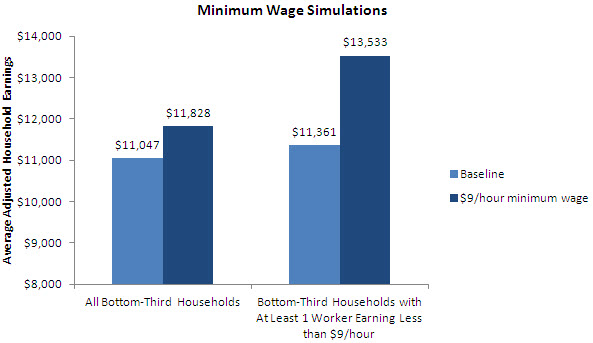Acting Secretary of Labor Seth Harris has been making the rounds to promote the Obama Administration’s plan for raising the minimum wage from $7 to $9. In a new paper that compares strategies to improve the earnings of low-income households, we find that increasing the minimum wage would go a long way to help those in the bottom-third of the income distribution who are currently supported by sub-$9/hour earners. The higher minimum wage would boost these household’s earnings by about 19%.

Many of the earners in the bottom third are already making more than $9/hour, so by itself, raising the minimum wage would only improve average annual earnings for the entire bottom-third by a modest 7 percent. But there’s reason to believe this might be too modest an estimate: If you currently earn $9.50/hour, the new minimum wage won’t have a direct impact on your earnings, but a higher minimum wage might cause your boss to give you a modest raise in order to retain someone with slightly more experience or skill. If a higher minimum wage causes employers to bump up pay for workers who currently earn just above $9/hour, then the impact on average earnings for the bottom third would be higher. It’s also possible that if work paid more, then more low-skilled workers would be incentivized to find minimum-wage jobs. While some argue that a higher minimum wage would dampen employers’ willingness to hire workers the best evidence concludes that any impact would be minimal.
Overall, we think that a higher minimum wage should be one part of a larger strategy to improve the economic prospects of low-income families. Alone, it won’t make a big impact, but combined with policies that lower unemployment, boost earnings (e.g., the Earned Income Tax Credit), and improve education, it could help more families move into the middle class.


Commentary
Raising the Minimum Wage: Will it Help?
July 1, 2013